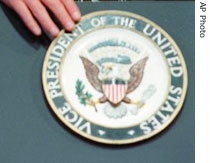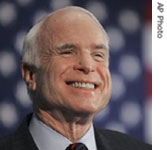-
(单词翻译:双击或拖选)
An expert on the U.S. vice1 presidency2 discusses how the position has changed. Transcript3 of radio broadcast:
13 June 2008
This is IN THE NEWS in VOA Special English. The candidates for president of the United States now face what some call the biggest decision of their campaigns. Republican John McCain and Democrat4 Barack Obama have to choose a vice president.
The candidates for president of the United States now face what some call the biggest decision of their campaigns. Republican John McCain and Democrat4 Barack Obama have to choose a vice president.
The Democratic Party will hold its presidential nominating convention at the end of August. The Republican convention is the first week of September.
Presidential candidates have not always had to choose. In America's first four elections, the candidate with the second most votes became vice president.
That changed after the election of eighteen hundred. Thomas Jefferson and Aaron Burr received the same number of electoral votes. The House of Representatives had to decide. Jefferson won -- on the thirty-sixth vote.
Since then, the president and vice president have been elected separately. But they run for office together.
The Constitution gives the vice president three responsibilities. One is to serve as president of the Senate. Another is to break any tie vote in the Senate. And the third is to replace the president in case of death, disability, removal or resignation.
Vice presidents have become president nine times. Eight were the result of a president's death. The ninth was because a president, Richard Nixon, resigned.
For the first half of American history, the main job of the vice president was serving as president of the Senate. Then, during the twentieth century, vice presidents became more involved in the activities of the executive branch.
Law professor Joel Goldstein at Saint Louis University in Missouri is an expert on the vice presidency. He says a major turning point came in nineteen seventy-seven when Walter Mondale became Democrat Jimmy Carter's vice president.
The professor says Walter Mondale had more responsibility than any vice president before him. He had an office near the president in the West Wing of the White House. He held private weekly meetings with the president. And he became one of his top advisers5.
 |
| John McCain |
The four vice presidents since Walter Mondale have had the same level of involvement, the professor says, if not more. The current vice president, Dick Cheney, followed Al Gore6, Dan Quayle and the first George Bush.
As a result of all this, the job of choosing a vice president has become more important. One thing candidates look for is someone to help balance their own weaknesses.
 |
| Barack Obama |
But no one can meet every need. So, as Professor Goldstein says, candidates start with a wish list, then make changes to fit reality.
And this year, one reality is that almost eighteen million people voted for Hillary Clinton. She ran a close race against Barack Obama. Come November, how many of those women and men will vote for John McCain, or not vote at all? This is a question for both nominees7 as they search for the right man -- or woman -- for their running mate.
And that's IN THE NEWS in VOA Special English, written by Brianna Blake. I’m Steve Ember.
 收听单词发音
收听单词发音
1
vice

|
|
| n.坏事;恶习;[pl.]台钳,老虎钳;adj.副的 | |
参考例句: |
|
|
|
2
presidency

|
|
| n.总统(校长,总经理)的职位(任期) | |
参考例句: |
|
|
|
3
transcript

|
|
| n.抄本,誊本,副本,肄业证书 | |
参考例句: |
|
|
|
4
democrat

|
|
| n.民主主义者,民主人士;民主党党员 | |
参考例句: |
|
|
|
5
advisers

|
|
| 顾问,劝告者( adviser的名词复数 ); (指导大学新生学科问题等的)指导教授 | |
参考例句: |
|
|
|
6
gore

|
|
| n.凝血,血污;v.(动物)用角撞伤,用牙刺破;缝以补裆;顶 | |
参考例句: |
|
|
|
7
nominees

|
|
| n.被提名者,被任命者( nominee的名词复数 ) | |
参考例句: |
|
|
|















